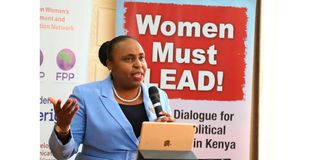Level political field for women’s participation

Nyeri Deputy Governor Dr Caroline Karugu speaks at a forum for Mt Kenya women dubbed ‘Women Must Lead’ dialogue at a Nyeri hotel on September 9, 2021. She has called for the formation of a women-led political party to champion women's interests.
What you need to know:
- This election season is when politicians and their parties use the carrot and stick to attract women for support.
- During campaigns, politicians go to the women -and often not in good faith - this majority voting gender is the most needy as they strive to raise families, especially at the grassroots.
Without a doubt, the forthcoming General Election is one of Kenya’s most anticipated.
With the incumbent leaving office at the end of his term in August next year, the impeding election is bound to be very competitive. The situation becomes more erratic with the bruising battles within the fractured ruling party Jubilee, especially the fallout in its leadership.
In the middle of it lies the thorny matter of unlevelled political field, with women on the receiving end. The gender equity and equality discussion in the country’s politics is a never ending conversation.
Regrettably, it has centred on the minimal presence of women in the political space, especially in leadership positions. As expected, the discussion becomes vibrant as a general election draws by. As a result of this trend and ‘tradition’ of discussions on the need to have more women in the political space, are now loud.
Sadly, it is also the season when politicians and their parties use the carrot and stick to attract women for support. Predictably, this, as always, is strictly for the season and hardly applies when it comes to political party nominations.
‘Generous’ politician
And during campaigns, politicians go to the women -and often not in good faith - this majority voting gender is the most needy as they strive to raise families, especially at the grassroots. As such, they become recipients of inducements of basic commodities such as sugar, lessos even irrelevant books for their children and small amounts of money.
These usually, are women from disadvantaged backgrounds who then find themselves voting for the ‘generous’ politician who unfortunately, ends up as the wrong leader.
Ahead of the 2022 election is the critical issue of female candidate’s involvement and inclusivity, especially for mainstream political parties. The unfortunate tendency, largely for parties that pick female candidates, is usually in areas where the party is not strong.
That is why Nyeri deputy governor Caroline Karugu’s proposition for a women-led political party to champion interests of the female gender is not far-fetched. Making the call last month, Dr Karugu was of the view that such a political party, led by women but with a membership comprising all gender, would champion women’s political interests including for the presidency.
Gender diversity
While the deputy governor was reported as proposing such for the Mount Kenya region, the party would resonate nationally. This is because, as Dr Karugu rightly argued, Kenya’s parties, especially the mainstream ones, are male-dominated and insensitive to gender diversity.
Given that the matter of gender inequality in political leadership has persisted with a clear reluctance to change the status quo, the solution is to be intentional to ensure women are not just the majority voters, but their equal representation in political parties and positions are guaranteed.
The hostility and reluctance that has met implementation of the two-thirds gender rule in Parliament sends the clear message-of lack of the political will to implement the same.
This has been evident in the loud criticism that met former Chief Justice David Maraga’s 2020 advisory to President Uhuru Kenyatta to dissolve Parliament for failure to implement the two-thirds gender rule. Similar denigration was targeted at women and the few male advocates of the gender rule by mainly parliamentary colleagues.
Peculiarly, some of the loudest opponents of the two-thirds rule were in the front-line in support of the failed Building Bridges Initiative (BBI), which, incidentally, had some impressive suggestions on achieving affirmative action in the political field.
Political parties’ leadership
To illustrate this goodwill, these politicians need stand up to be counted, in ensuring that the affirmative action is implemented, in the coming election and beyond, the BBI disappointment notwithstanding.
Nevertheless, there are few women political leaders who have benefited from what may have been at the time-gender sensitivity political parties’ leadership.
Some of them have ended up successful, politically, after working from that ‘goodwill.’ They include Gilgil MP Martha Wangari Wanjira, who first got into Parliament through a nomination to the Senate by United Democratic Forum party.
In the 2017 election, Ms Wangari successfully vied for the current seat on a Jubilee ticket. There are also leaders such as Millie Odhiambo-Mabona the Suba North MP and the former Runyenjes MP Cecily Mbarire, who were first nominated to Parliament by their parties. Ms Beatrice Elachi, the CAS for Gender Affairs and a former Speaker of the Nairobi County Assembly is also in this category. She was nominated to the Senate by the Alliance Party of Kenya.
It is not too late to take deliberate action to ensure fairness and a level playing ground for women.
Ms Rugene, a former Parliamentary Editor at the Nation, is founder, The Woman’s Newsroom Foundation. [email protected] [email protected]





